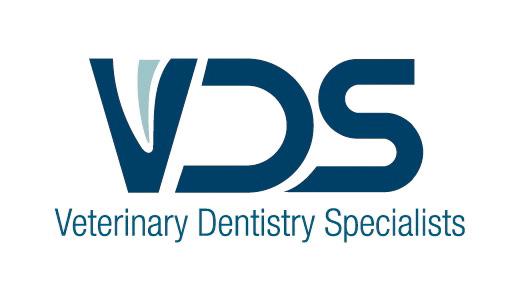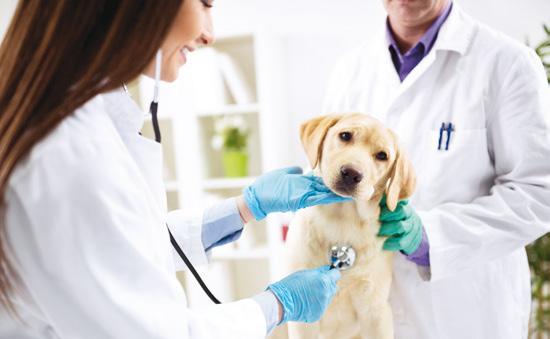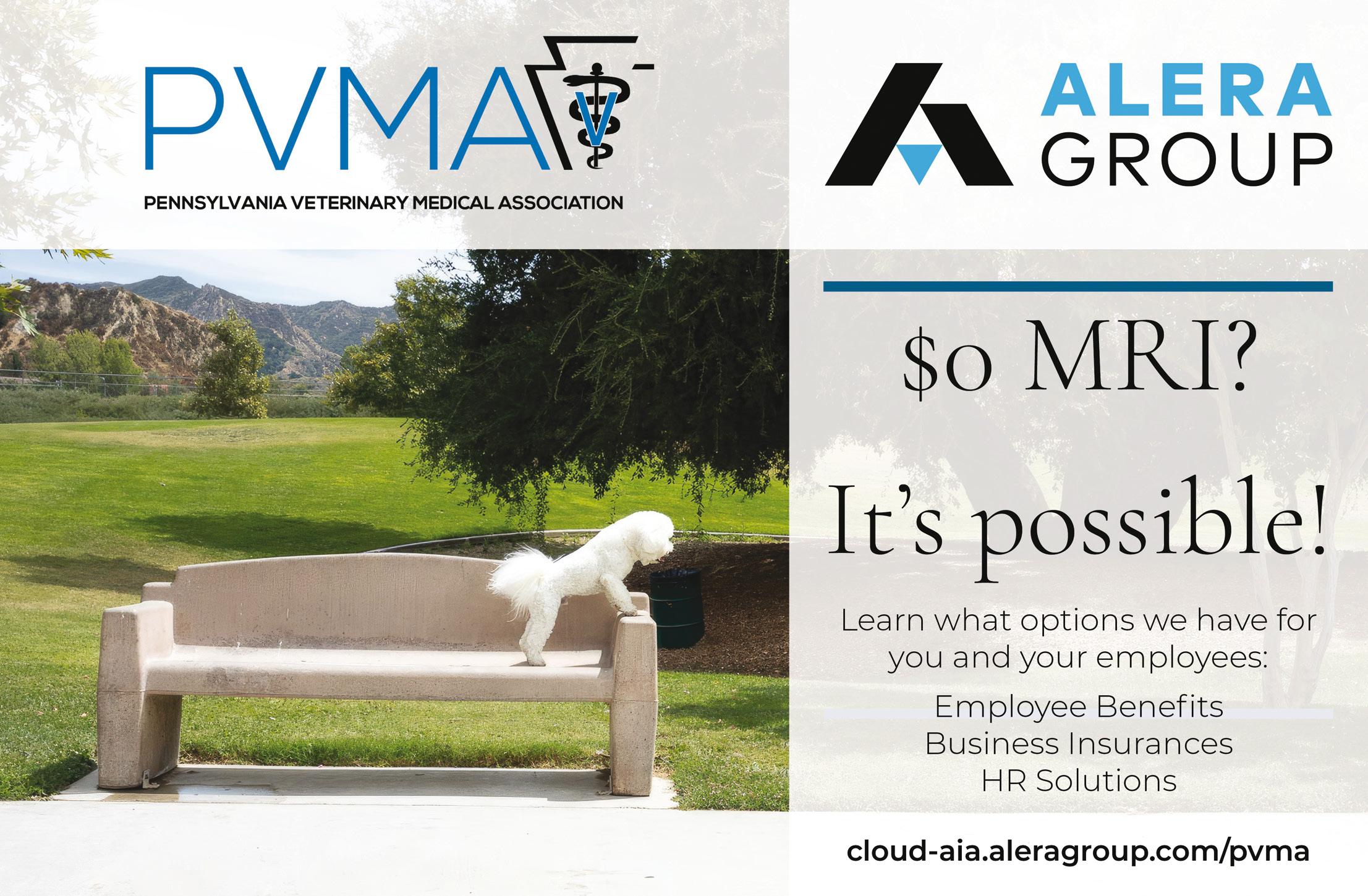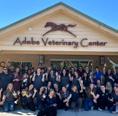






Founded in 1972, VRC (Veterinary Referral Center) was one of advanced orthopedic surgery. Today, we offer a multidisciplinary team of specialists who are skilled at performing a range of sophisticated diagnostic, medical and surgical procedures.
Our comprehensive services include:
•24/7 Emergency & Critical Care
•Advanced Diagnostics & Radiology
•Anesthesiology & Pain Management
•Cardiology
•Dentistry & Oral Surgery
•Internal Medicine

•Medical Oncology
•Neurosurgery
•Ophthalmology
•Physical Rehabilitation
•Radiation Oncology
•Specialized Surgery

To refer a client or consult with a specialist, please call 610-647-2950, email reception@vrcmalvern.com, or visit our website at vrcmalvern.com.



VRC is proud to offer a full range of dental and oral surgery services and conditions treated include (but not limited to):
VRC is proud to offer a full range of dental and oral surgery services and conditions treated include (but not limited to):
•Oral malodor or inflammation
•Oral malodor or inflammation
•Neoplasia
•Neoplasia
•Fractured teeth
•Fractured teeth
•Orthodontics
•Orthodontics
•Jaw fracture repairs
•Jaw fracture repairs
•Oral defects
•Oral defects
•Periodontics
•Periodontics
•Restorations
•Restorations
The highest quality of care, for the best quality of life.
The highest quality of care, for the best quality of life.
OPEN 24/7, 365 DAYS A YEAR | 610-647-2950
OPEN 24/7, 365 DAYS A YEAR | 610-647-2950
340 Lancaster Ave | Malvern, PA 19355 | vrcmalvern.com Han
340 Lancaster Ave | Malvern, PA 19355 | vrcmalvern.com Han


Since we opened our doors in 2019, we have experienced consistent growth due to your confidence in us for the care of your patients. For that, we profoundly thank you
Our clients come from all walks of life and many from miles away. But what they all have in common is a beloved pet with oral cancer or significant dental and anesthetic needs. We are honored to help, and our consistent 5-star online reviews show our commitment to concierge-level care and service.
We’d like to introduce you to the VDS Chadds Ford clinical team, including our newest members: Dr. Kelly Saverino, Dr. Becca Feuer, and Dr. Melanie Jarrett.
We welcome your call should you wish to consult about a challenging case, or, if you make a referral for care, please know we promise your clients and patients an exceptional experience.

VDS is the only referral practice in the nation dedicated to advanced dentistry and oral surgery for pets where a full-time board-certified veterinary dentist and a board-certified veterinary anesthesiologist are on staff to ensure the safest and most comfortable experience… and the best possible outcome.
Beginning January 22, 2024
Dr. Herrmann will see
patients at our Chadds Ford location Monday through Thursday.
Subscriptions:
The Keystone Veterinarian is mailed to PVMA Members at no charge as a member benefit.
Subscriptions are available to non-members for $30/year or $10 for a single issue. Please contact Membership@PaVMA.org if you’re interested in receiving the Keystone Veterinarian magazine.
Notice to Readers:
Neither this publication, Hoffmann Publishing, nor PVMA assumes responsibility for material contained in articles and advertisements published, nor does publication necessarily constitute endorsement or approval of the advertiser, product, service or author viewpoint by the Keystone Veterinarian, its editors and publishers or the Pennsylvania Veterinary Medical Association. In addition, neither this publication nor PVMA guarantees the accuracy, reliability or completeness of any facts, views, opinions, recommendations, information or statements contained within this publication.
Reproduction in whole or in part is prohibited without the permission of the Pennsylvania Veterinary Medical Association.
The Pennsylvania Veterinary Medical Association is dedicated to ensuring the vitality of the veterinary profession by promoting excellence in veterinary medicine, advancing animal health and welfare, and protecting and enhancing human health. PO Box 468, Elizabethtown, PA 17022 717.220.1437 | Info@PaVMA.org
President:
Thomas Munkittrick,
BOARD OF TRUSTEES
Western Region Trustee: Erin Johnson, DVM
North Central Region Trustee: Andrea Carr, DVM
South Central Region Trustee: Gary Brummel, DVM
Metro Philadelphia Region Trustee: Marisa Brunetti, VMD
Equine Veterinarian At-Large: James Holt, VMD
Production Animal Veterinarian At-Large: Robert Cloninger, VMD
Academic Veterinarian At-Large: Alessandro Lamacchia, VMD
Certified Veterinary Technician At-Large: Ashley Elliott, CVT
AVMA Delegate: Tina Dougherty, VMD
AVMA Alternate Delegate: Kate Boatright, VMD Student At-Large: Roxy Ackerman


 Thomas Munkittrick, MS, DVM President, Pennsylvania Veterinary Medical Association
Thomas Munkittrick, MS, DVM President, Pennsylvania Veterinary Medical Association


This letter should be addressed to all members of the PVMA and not just to myself. Specifically, I would like to recognize members of our legislative committee and our lobbyist for their efforts with the Dog Law in Pennsylvania. The Dog Law Act originally passed in 1982 and was recently amended in 2023. We are happy to acknowledge our partnership with the PA Department of Agriculture and thank Secretary Redding and Governor Shapiro for recognizing our efforts to help pass SB 746. Once implemented, Act 18 will provide ample resources to improve the quality of life for all dogs and their human companions in Pennsylvania.
As we reorganize PVMA, we look for volunteers to aid our committees. Our Advocacy committee is under constant change and challenges. We work hand and hand with our lobbyist to provide sound information to our state government with regards to animal welfare. We are happy that the PA House and Senate utilize our expertise to make sound decisions for animals in PA. I hope to inspire members to become active in any committee and VOLUNTEER!
We are truly honored to be recognized by Secretary Redding and Governor Shapiro.
YOUR MEMBERSHIP MATTERS!
Thomas W. Munkittrick PVMA President
 By Christine Staten, DVM, MBA
By Christine Staten, DVM, MBA

Everybody is talking about culture in the veterinary workspace. A positive culture is one of the top reasons that people join a practice, and a negative culture is one of the top reasons people leave a practice. In today’s veterinary employment landscape, a positive culture is critical for recruitment and retention of a high-performing team.
Studies show that a positive work culture increases team member engagement. This engagement leads to some awesome things – less absenteeism, less turnover, more productivity, fewer work-related accidents, less stress, less burn out, and healthier people, both mentally and physically. You can’t afford not to focus on your culture.
So, we know we want a positive work culture, but what does that look like and how do you get it? And just as importantly, how do you keep it?
The Adobe Veterinary Center team is built and maintained with a strong purpose in mind.
It all starts with a strategic plan:
1. You need to know your vision. Where do you want to go?
2. Then figure out how you’re going to get there, which is your mission.
3. Determine core values to define your behavior. These are the guiding beliefs of your practice.
You’ve got to lock these in and make sure they’re active in your practice. Without a purpose, it’s hard to get people all moving in the same direction.

We understand that starting, running, and expanding a practice is no small feat. Our team of Relationship Managers offers years of experience partnering with veterinary professionals to develop custom strategies that address your distinct healthcare business needs.


Team Culture: If you don’t get this right, nothing else matters.
continued from page 6
Adobe Veterinary Center works to be the most trusted and respected pet care provider in our community by administering the best possible medical care to every patient and giving outstanding service to every patient and every pet owner.
COMPASSION – Love and care for the people and pets we serve.
EXCELLENCE – Exceed expectations in everything we do.
INTEGRITY – Do the right thing always.
GROWTH – Embrace opportunities to learn and improve.
STEWARDSHIP – Use our resources efficiently and effectively to serve people and pets.
TEAMWORK – Collaboration and mutual support are essential to our effectiveness.
ADOBE VETERINARY CENTER PROVIDES PREMIERE SERVICE TO:
Our team members are our greatest asset. They are some of the hardest-working, brightest talents in the veterinary field and they are motivated by the patients and owners that they care for, a positive and collaborative work environment, a sense of pride in our practice, and lifelong learning. We will attract and support them by investing in skill and knowledge-based advancements, excellent wages and benefits, recognition, continuing education, work/life balance, and giving them a voice in how the practice moves forward.


We are committed to providing the most compassionate, ethical, up-to-date, and quality care to all of our patients in a low-stress environment. Our patients are treated as if they are our own family members and we put their health, comfort, and wellbeing above all else. We strive to be leaders in our fields and offer the most advanced health care to our patients, providing state-of-the art technology and outstanding care providers.
We build lasting relationships with our pet owners with trust, respect, and integrity as the foundations of our practice. Empowering our pet owners with knowledge, individually during their pet’s exam and collectively out in the community, invites them to be an active partner in their pet’s care. We are attentive to owners’ concerns and provide exceptional, timely, and friendly service to them, treating them as guests in our home.
Our belief at Adobe Veterinary Center is that mankind has been given the gift of animals, and that compassionate care of such is our obligation. God has blessed us with great opportunities and we will carefully and lovingly use the talents and gifts that we have been given in our interactions with people and animals. We will treat others the same way we want to be treated with honesty, integrity, dignity, and compassion.
We’re deeply connected to the Tucson community where we operate and have a long history of doing our part to help it thrive. Since our beginning in 1979, we have been locally owned and committed to giving back to the community in which we live and work. We invest our time, talents, and treasures in efforts to meet the needs of, enrich, and improve our local community. A vibrant Adobe Veterinary Center and a vibrant community are interdependent on one another.

Monica Dixon Perry, CVPM, Director of Veterinary Consulting Services at Burzenski & Company, has more than 35 years of experience working in the veterinary management world. Monica’s depth of knowledge and ability to identify practice needs make her an invaluable resource for veterinary practices of all sizes.
Give Monica a call today and see how she can help your practice run at its very best.
Monica Dixon Perry, CVPM Director of Veterinary Consulting Services
Email: monica@burzenski.com
Phone: 203.468.8133
Define what a positive culture looks like on a daily basis in your practice by setting and enforcing practice standards based upon your vision, mission, and values. Put these in writing in the form of a policy manual, an employee handbook, standard operating procedures, behavioral expectations, or other documents.
But it’s not enough to just put it in writing and have your team sign it. You need to talk about it. You need to live it. You need to recognize and reward it. And you need to enforce it.
How do you do all this? Start by asking them to describe their perfect work environment. Use that to create policies and behavioral expectations. To get buy-in from the team, you must ensure that they understand the benefits to the patients, the clients, the practice, and themselves.
In addition to defining your ideal culture, you must make sure that you are hiring the right people and keeping the wrong people out. This is the single most important thing you can do to maintain a positive culture. Once you’ve got your dream team, have clear and open communication channels. Everyone should be empowered and have a voice. Mutual respect, collaboration, trust, and support between everyone is not only desired, but also necessary, and it must be fostered.
Mobile: 919.262.4634
www.veterinaryfinancialadvisors.com
100 South Shore Drive, East Haven, CT 06512-4668
Be vigilant about rewarding positive behavior and addressing negative behavior. Nothing will erode a culture faster than allowing one person to behave in a way that is contrary to the culture you’ve defined. Believe me, I know. That one tech who is so proficient in her skills and so great with clients, but always seems to be speaking negatively about team members when they’re not there? She needs to be held to the same standards as everyone else or she needs to leave. To ignore the behavior will destroy the trusting relationship you have with your team. It will destroy your culture.
By strategically building and maintaining your positive culture using the tactics above, you will have a practice that people love driving to each morning. Everything will run smoother. Your team will be happier. And yes, you will be happier. Much happier.
About the Author: Christine Staten DVM, MBA, owns an 11-doctor mixed animal practice in Tucson, Arizona. With her company Veterinary MBA, Dr. Staten is enthusiastically helping other practice owners and managers create more sustainable business models while gaining more time, money, and freedom in their lives. Follow along on Instagram @veterinary_mba and @dr.christinestaten and join her newsletter list at veterinary-mba.com.

 By Rena Carlson, DVM
By Rena Carlson, DVM
No one needs to tell a veterinarian or veterinary team member that our jobs, while incredibly rewarding, can also be very challenging. While COVID-19 exacerbated stresses across society, veterinary practices were focused on workplace wellbeing long before that.
With more than 105,000 veterinarians in all US states and territories and beyond, the American Veterinary Medical Association has members in every area of veterinary practice – in clinical settings and universities, government agencies and industry, big cities and sparsely populated rural areas. Identifying and promoting infrastructures that help members build sustainable cultures across such a widely diverse profession is ongoing and multifaceted work. To achieve this, AVMA engages in a holistic approach with the goal of enabling veterinarians and team members to thrive and provide even better outcomes for patients and clients.
In recent years, we have worked diligently with enthusiastic partners throughout our profession to develop such initiatives, which fall into two broad and intersectional categories: Workplace Wellbeing and Diversity, Equity and Inclusion (DEI).
As the AVMA’s President, I thank the Pennsylvania Veterinary Medical Association for this opportunity to report on our progress and share some of our future initiatives.
The AVMA hired Jen Brandt, who has a PhD in social work, as its first Director of Wellbeing Initiatives in 2017, and under her guidance has developed a wealth of resources for veterinarians and team members, which is available in the AVMA’s Wellbeing Center (see sidebar). A foundation of the AVMA’s efforts are the Workplace Wellbeing (WPWB) programs, first launched in 2019 and updated since then.
In creating the WPWB programs, Dr. Brandt partnered with Marci Kirk, DVM, the AVMA’s Associate Director of Veterinary Outreach and Engagement; Deb Stone, PhD, Assistant Director of Continuing Education, and their colleagues, with generous support from Merck Animal Health.
“We had three overarching goals in mind,” Dr. Brandt says. “We wanted to shift the wellbeing conversations from solely being
about individual health and mental health, to recognizing the broader scope of wellbeing, and the roles that work culture and systems play in our overall wellbeing; to make resources accessible; and to translate evidence-based knowledge into tangible action steps that any member of the team could initiate.”
WPWB #1 (Setting the Foundation) and #2 (Self and Social Awareness) are available online for Continuing Education credit and are among the most popular programs on the AVMA’s digital education platform, Axon. Here’s some of the feedback submitted to the AVMA from veterinary professionals who have taken the WPWB #1 and #2 courses:
• “I really learned while doing the course. It was nice to be able to stop/pause the slides and reflect. The quizzes made it easy to commit the learning consciously to memory.”
• “I liked the different presenters and different point of views. It was very helpful in things we see on a regular basis in the workplace.”
• “I really enjoyed the interactive nature of the program and the supplemental material.”
• “I appreciated the ability to take these courses online and at my own pace.”
In January 2024, Merck Animal Health released the results of the fourth annual Veterinary Wellbeing Study. This was the first comprehensive study on veterinary wellbeing following the global pandemic and its impact on veterinary professionals. The findings underscored a positive trend in veterinarian practices and professionals taking a more proactive approach toward mental health.
“It is encouraging to see an increase in practices and professionals that are addressing team culture, wellbeing, and mental health,” said Christine Royal, DVM, vice president, companion animal and equine business unit, Merck Animal Health. “We remain committed to advocating for and providing resources to veterinary professionals no matter the individual’s role or title.”
Another key component of workplace culture is Diversity, Equity and Inclusion (DEI). In late 2022, the AVMA – in partnership with the Veterinary Medical Association Executives (VMAE) and with strong support from leaders across the profession – launched “Journey for Teams,” the most ambitious DEI initiative in the history of US veterinary medicine.
“Journey for Teams (JFT) provides a shared experience of learning, discovery, and growth for veterinary professionals seeking ways to bring DEI principles more fully into their lives and the veterinary profession,” Latonia Craig, PhD, the AVMA’s Chief DEI Officer, said at the AVMA’s Veterinary Leadership Conference in Chicago in January. “To date, I am
AVMA Axon: https://axon.avma.org/
AVMA Wellbeing Center: https://www.avma.org/resources-tools/ wellbeing Journey For Teams: https://www.journeyforteams.org/
Merck Animal Health Fourth Veterinary Wellbeing Study:
https://www.merck-animal-health-usa. com/newsroom/merck-animal-healthsfourth-veterinary-wellbeing-study-indicatesprogress-in-addressing-mental-healthchallenges-among-veterinary-teams
proud to share that we have over 18,000 users of the Journey for Teams platform across the globe.”
JFT modules are released monthly (the 16th was released on March 1); each includes a 5–7-minute video on a DEI topic, a worksheet highlighting three areas of awareness on DEI concepts, discussion materials and other resources. JFT is now available for CE credit on the AVMA Axon platform.
The next step in JFT’s evolution comes in June, when we will launch “Educational Sharpenings,” designed to focus on areas of conflict resolution with topics such as “Self-awareness,” “Reducing emotional reactivity,” “What if I say the wrong thing?” and more.
We also look forward to the AVMA’s inaugural Diversity, Equity, Inclusion and Wellbeing Summit, “Intersections: Where DEI and Wellbeing Meet,” November 7-9 in Atlanta. Registration for the Summit will open later this year and I hope you can join us there.
Through wellbeing programs, Journey for Teams and more, and with the support of partners in industry, academia, and the philanthropic community, we will continue our progress in achieving healthier team cultures, stronger client relationships and better community connections – all with the overarching goal of improved care for our patients.
About the Author: Dr. Rena Carlson is President of the American Veterinary Medical Association. Her career has spanned more than 30 years and has included clinical work, practice ownership, university attending veterinarian, university accreditation, and academic research.


For decades, there seemed to be no secret “sauce” to staff retention strategies. Compensate the employee fairly was first and foremost, and a distant second was to provide them with some amount of job satisfaction.
Fast forward to 2024, and Oh, how the landscape has changed! Gen Z employees are switching jobs at a historical rate – 134% higher compared to 2019. Our industry is clearly feeling the effects of this – DVM turnover is twice that of an MD and CVT is more than 50% higher than an RN.1 Not only are we seeing our industry’s professionals leaving and/or switching jobs at a rapid rate, but we are also seeing them requesting to work fewer hours during an already chaotic and unstable workforce.
So, let’s summarize our current environment: fewer trained staff working less hours. A perfect storm for disaster!
For the better part of this decade now, practice owners and managers have been living in a state of damage control; most of your days are probably spent “putting out fires,” whether it’s with your team members, clients, or even both some days. Unfortunately, staff retention issues are one of the major reasons why this chronic instability in our workforce still exists.
It’s no secret that staff turnover has major consequences to both the ”mental” and ”physical” health of a practice. Most notably, operational efficiency is greatly reduced due to a practice always operating understaffed or always operating with staff in training. This ultimately leads to a drastic decline in patients receiving the care they need — and isn’t that why we are here in the first place?1
Furthermore, your trained staff are spread extremely thin, leading to constant frustration and burnout and creating that toxic work environment we are always discussing how to avoid. Let’s not even dive down the rabbit hole of financial strain that turnover has on a practice. Just to give you an idea, the Center of American Progress estimates the cost of turnover is 20% of an employee’s annual salary for an individual earning less than $50,000 per year, while higher paying jobs (i.e. Veterinarian) can cost your practice up to 2x that individual’s annual salary.
How serious of an issue is your practice viewing staff retention? Obviously, our industry has a problem with it, and we can’t just say, ”It’s just the way this new generation is!” or ”They aren’t going to quit. They have been here 7 years!”
First, let’s look at what the majority of practices are doing to improve staff retention. Most common strategies currently center around improving work-life balance and making sure the employee is still more than fairly compensated. Other strategies include expanding fringe benefits and opportunities for professional development.
Now, let’s realize we must do more and really start to think outside the box when it comes to improving retention. As an owner or manager, we must break this issue down all the way to the ”cellular” level, and we can’t believe implementing some new, fancy “umbrella” policy for the whole practice will be the answer. I am going to highlight some employee strategies that I have utilized in my own practice that have worked well since I opened in 2009.
Give your key personnel, whether it's support staff or Veterinarians, autonomy. Don’t MICROMANAGE! You need to allow your most trusted and skilled personnel to breathe and not always be looking over their shoulder – groom them and train them to make their own decisions from the jump. Allow them to make mistakes (because we all do!) without fearing major consequences. The great ones will learn from their mistakes, and self-growth can only occur when people are challenged to step outside their comfort zone. Our job as true leaders is to know how to encourage our employees to do so.
I have even taken the idea of autonomy in my practice to another level. It obviously will not work in all practices, but I allow my key personnel (my senior technicians and veterinarians) to make their own schedules. I don’t believe in babysitting, and you shouldn’t either. Hold your staff accountable for their days off and make it their responsibility to make sure their shifts are covered when they choose to use their PTO. I started this concept about 10 years ago, and I will never look back.
Autonomy is a scary word for a practice owner. It’s very easy to let doubt creep into your mind. You instantly are thinking, ”What if they make the wrong decision?” Trust me, I get it, but as an owner and a manager, you must be able to identify the leaders in your practice who can handle this responsibility. It isn’t for everyone, and unfortunately just like the staff, we will probably make a mistake or two.
(2) Utilize Skillsets
Put your staff in a position to succeed. Your employees are proud of the skills they have learned through schooling or training, and they have a strong desire to show off and develop these skills further. This doesn’t just pertain to technical skills, but it also applies to social skills that help enhance the client experience in your practice. Make sure to identify the strengths of the employee and allow them to utilize those strengths while they work on their weaknesses. If a technician struggles with client communication but is a technical “magician,” you might want to start them more in the treatment area to get them adjusted to the practice while you work on their client communication slowly.
Make sure you listen to your employees to get a deeper insight into their strengths and weaknesses in the job setting. Celebrate them when warranted and ensure development is natural and organic; remember, we will need to push some employees to step outside their comfort zone, but that doesn’t mean we set them up to fail.
(3) Get them Vested
Make your employees feel important and allow them to take ownership in the practice’s growth and accomplishments. Don’t underestimate the power of care. It’s hard to believe sometimes, but much of your staff knows the practice’s success is much bigger than just them. It’s a leader’s job to show the staff how much they mean to practice’s success. Allow your staff to help direct the vision of the practice, and they will immediately become invested. At the end of the day, it’s all about creating a success story together.
Once you know you have key personnel vested, don’t be afraid to reward them for it and secure them long term. We need to think of these key personnel as investments and know they deserve to grow as the practice grows. I recently set up two of my most trusted and invested employees (non-veterinarians) with whole life legacy policies that will be funded by the practice on a yearly basis as long as the individual is employed. These policies are guaranteed and tax-deferred that will continuously increase in value and provide a death benefit for the policy holder. Even when the employee retires or chooses to end employment, they will still be able to continue fund the policy if they choose, but in the end, it is THEIR policy. The nice caveat is that the practice will only fund it during employment, keeping them vested in the practice for that reason alone.
I think the writing is on the wall at this point – we need to be creative and step outside of our own comfort zones when it comes to thinking about staff retention. Not to sound too

cliche, but ”Retention is the new Recruiting,” and we need to work harder than ever right now at improving it.
References:
1. Walker M. (February 17, 2024). Exploring unconventional solutions to address the healthcare provider shortage: the intersection of human and veterinary medicine. Medriva. Available at https://medriva.com/ health/healthcare/exploring-unconventional-solutions-to-addressthe-healthcare-provider-shortage-the-intersection-of-human-andveterinary-medicine/.
About the Author: Boomer Pearsall, CVPM, has been owner of Penn-Ohio Veterinary Services, LLC with his wife, Dr. Nicole Pearsall, since 2009. Boomer graduated from La Roche University in 2003 with a B.S. in Biology and Chemistry, and he later graduated with his Master’s degree from Duquesne University in 2005 in Biological Sciences. After opening the clinic in 2009, Boomer completed his certification in Veterinary Practice Management from Purdue University and later passed his board exam through the VHMA in April 2021 to officially become a Certified Veterinary Practice Manager (CVPM). Outside of work, Boomer lives a very active lifestyle owning a horse farm in Canton, Texas and also competing in weightlifting.


 By Emily Singler, VMD
By Emily Singler, VMD
When any member of the veterinary team discovers they are pregnant, or if they are planning a future pregnancy, many questions can arise about the workplace hazards veterinary professionals encounter and how they might affect the health and development of the embryo or fetus. The health and safety of the pregnant individual, along with their ability to continue their employment during pregnancy, are also extremely important.
Employers and managers who have not previously navigated pregnancy while working in veterinary practice may not have a thorough understanding of the extent of the risks. Unfortunately, human healthcare providers are not always well versed in the workplace exposures veterinary professionals frequently encounter. For these reasons, it is often up to the pregnant individual to find information and resources on their own, which can cause additional stress and uncertainty.
My experiences working in small animal clinical practice during my pregnancies inspired me to research and write a comprehensive manual for working in veterinary practice during pregnancy and beyond, Pregnancy and Postpartum Considerations for the Veterinary Team. In most cases, my research confirmed that with proper precautions, the risks of most safety hazards can be greatly reduced for personnel who are pregnant or who may become pregnant.
Here, we review some general strategies to prioritize the safety of any pregnant individual in the workplace. These principles are generally also good safety practices for all members of the team.
Pregnant individuals are at higher risk for complications as the result of exposure to radiation, infectious diseases, and drug or chemical exposure. In some cases, such an exposure can lead to an adverse pregnancy outcome, such as pregnancy loss or preterm labor. For this reason, it is essential that all employees have access to appropriate PPE when working in radiology, when handling potentially infectious material, or when handling drugs or chemicals to prevent any accidental personnel exposure.
Just as it is essential that PPE be available and appropriately used, other equipment in the hospital must be maintained in good working order to keep all personnel safe. The anesthetic scavenger, for example, reduces the risk of exposure to waste anesthetic
gases (WAG) by up to 90%. The anesthesia machine itself must also be serviced and checked regularly for leaks to help reduce WAG exposure.
The proper use of physical and chemical restraint can greatly reduce the risk of injuries such as bites, scratches, needlesticks, falls, and kicking, crushing, or trampling injuries. All personnel should be required to make sure they have adequate help when handling a patient and that they use available physical aids such as muzzles, stocks, and chutes when needed. Pregnant equine and other large animal practitioners can benefit from having a technician or assistant accompany them on their calls. Increasing the use of pre-visit pharmaceuticals and sedation protocols can keep personnel and patients safe and reduce stress for all parties.



August 15 – 18 | Hershey, PA Registration Now Open!
Depending on the work responsibilities of the pregnant individual, there may be some duties that they wish to avoid during pregnancy. This may be because of the safety risk involved (e.g. restraining fractious patients or handling prostaglandins, for example), because of pregnancy complications the individual is experiencing (e.g. nausea, fatigue, high blood pressure, dizziness), or because an individual is not comfortable with the risk (e.g. taking radiographs or having regular inhalant anesthetic exposure). In any of these cases, the pregnant individual may request a reasonable accommodation to help them safely and comfortably continue to work throughout their pregnancy.

While employers should not impose accommodations or changes in job responsibilities on the individual simply because they are pregnant, they should make every effort to honor the individual’s request for accommodations provided that they do not cause “undue hardship” to the business. The recently passed Pregnant Workers Fairness Act requires employers who have 15 or more employees to make reasonable accommodations for pregnant employees and prevent any discrimination against them due to their pregnancy.
Pregnancy can be a stressful time for many individuals, especially if they are unsure of how their employer will respond to their pregnancy announcement. Studies have shown that workplace stress can increase the risk of pregnancy complications. Furthermore, personnel who do not feel supported by their workplace during their pregnancy are less likely to want to return to the practice after giving birth. For these reasons and
November 2 – 3 | Pittsburgh Details Coming in Spring 2024
Scan this code to access the PVMA calendar of events and online registration.

many more, it is very important to create a culture where all personnel feel valued, respected, and safe from discrimination. This can help support not only their emotional health, but their physical health as well.
To learn more about the ways in which risks can be mitigated in greater detail, Pregnancy and Postpartum Considerations for the Veterinary Team is now available. It’s a way to learn more about the unique needs of pregnant veterinary team members. Supporting them during this critical period in their lives is not only the right thing to do, but the best way to benefit from all they contribute to the practice of veterinary medicine during their pregnancy and beyond.
About the Author: Dr. Emily Singler is a 2001 graduate of Penn State University and a 2005 graduate of University of Pennsylvania School of Veterinary Medicine. Her career in veterinary medicine has included experience in shelter medicine, private practice, mobile practice, and as a relief veterinarian. She currently works as a veterinary writer, consultant, and mentor and enjoys writing for both pet owners and veterinary professionals. Her writing interests include public health, preventive medicine, the human-animal bond, and life as a working mom. She is the author of Pregnancy and Postpartum Considerations for the Veterinary Team, available now at www.emilysinglervmd.com.


Mentorship has become quite the buzzword in our profession. While the concept is most often discussed in the context of supporting new graduate and early career veterinarians, mentorship plays an important role in professional and personal development for all members of the veterinary team and at all career stages. Here are five ways your practice can support mentorship for your entire team:
1. Remember that mentorship is more than a training plan.

While having a training plan is important for new team members, mentorship goes beyond simply training technical skills. At its core, mentorship is “a twoway relationship and type of human development in which one individual invests personal knowledge, energy, and time in order to help another individual grow and develop and improve to become the best and most successful they can be.”1
Strong mentorship will provide individualized support for individuals who are working toward targeted goals. In addition to supporting the development of technical skills, a mentoring relationship will help develop communication, leadership, wellness, and interpersonal skills. It will also provide support for working through challenging cases and situations in practice.
When working to promote mentorship in your clinic, identify potential mentors from each role in your hospital and pair them with new hires. Make sure you schedule some regular time for mentor meetings where mentor and mentee have an opportunity to connect, discuss how things are going in the clinic, provide feedback, discuss mental health concerns, and adjust the mentoring plan to fit individual needs.
2. Identify team members who thrive in a teaching role.
While not everyone wants to be a mentor, some team members will excel in this role. The most important qualities of a mentor are that they are available and willing, have good emotional intelligence, and have strong communication skills.
Remember that any member of the team can serve as a mentor. Veterinarians can benefit just as much from the mentorship of their credentialed veterinary technicians and other team members as they can from the mentorship of a fellow doctor.
Ask which team members have an interest in mentoring new hires or less experienced team members. Then ask them to complete a skills assessment where they can rank individual skills on a scale from “trying to learn” to “comfortable doing” to “comfortable teaching.” This can help determine which individuals are best suited to being mentors. A mentor doesn’t have to excel in every skill set. In fact, one individual could be mentoring a new hire on basic technical skills while simultaneously being mentored in a more advanced skill area.
3. Provide regular feedback.
Another essential component of mentorship is providing timely and specific feedback. A lack of feedback can affect the team in multiple ways. When a mentee is not receiving positive feedback, they may question if what they are doing is right, and this could negatively impact their confidence levels and perpetuate imposter syndrome. This can have a ripple effect in their efficiency and ability to continue to advance in their role.
On the flip side, an individual that receives no constructive criticism or negative feedback will not be able to correct behaviors that are deemed problematic. Consider a technician who is continually stocking inventory in the wrong location. If other team members simply roll their eyes and correct the mistake without making that individual aware of the problem, the errors will continue. Relationships between team members could be negatively impacted if they assume the mistake is made maliciously or out of laziness, not simply because the individual has never been told otherwise. What started as a simple error could escalate into a toxic environment that winds up costing employees when a few minutes of conversation and education could have corrected the problem.
Team members who are placed in the mentor role should be given regular opportunities to provide feedback to their mentees. Schedule this time and protect it, but be willing to provide feedback in the moment or shortly after a major issue arises instead of letting things fester for a month until the next scheduled meeting. Provide training for your mentors on strategies to provide effective feedback and be available to provide support or deliver some of the more sensitive feedback as a manager. Finally, don’t forget to allow the mentee to provide feedback as well, as this can be valuable in moving the mentoring relationship forward.
4. Create goals for professional advancement.
Encouraging both mentees and mentors to set goals can help support ongoing growth. Additionally, individuals who set goals are less likely to experience professional burnout.2 These goals can be in areas of technical skills but can also include communication skills, personal wellbeing, and interpersonal relationships.
Utilizing the SMART goals format helps individuals to set goals that are Specific, Measurable, Attainable, Realistic, and Time-bound. This paradigm for setting goals provides a way to measure progress. Instead of saying “I want to improve my phlebotomy skills,” an individual could say, “I want to perform 30 successful jugular venipunctures from dogs and cats in the next month.” The second example provides a way to measure the goal and a timeframe for which to complete it in.
5. Encourage team members to find mentors outside of the practice.
One of the best parts of mentorship is that there’s no single way to provide it. Mentoring relationships can be established in person or virtually; in the clinic or externally; short-term or long-term; peer to peer or traditionally; one-onone or in a group. There’s not one right way to mentor, and often, having a mentor outside of the clinic can help further support growth (see sidebar).
About the Author: Dr. Kate Boatright has been in small animal practice since graduating from the University of Pennsylvania in 2013. After nearly 8 years of fulltime practice in both GP and emergency clinics, she moved to part-time clinical work to pursue her passion for educating veterinary professionals as a freelance speaker and author. Dr. Boatright enjoys discussing mentorship, the unique challenges facing recent graduates, wellness, and the spectrum of care. She is the author of Veterinary Mentorship Manual, a resource for practices to help guide them in developing solid mentorship programs to support new graduates. She also works with practices as a mentor coach and consultant. Feel free to reach out by email (hello@writetheboat.com) or through Instagram (@writetheboat).
MentorVET: www.mentorvet.net
Pawsibilities VetMed: https://pawsibilitiesvetmed.com/
Ready Vet Go: https://readyvetgo.co/
Chirp: https://www.chirp.vet/
AAHA Guidelines: https://www.aaha.org/ aaha-guidelines/ 2023-aaha-mentoringguidelines/home/
Veterinary Mentorship Manual: https://sowl.co/s/bdrNCH
References:
1. Reinhard A, Quicksall MS, et al. 2023 AAHA mentoring guidelines. Accessed March 1, 2024. Available at https:// www.aaha.org/aaha-guidelines/2023-aaha-mentoringguidelines/home/.
2. VIS and Galaxy Vets. Burnout study in the veterinary profession. Published Nov 16, 2021. Accessed March 17, 2024. Available at https://galaxyvets.com/media-kit/ releases/burnout-study-in-the-veterinary-profession/.

July 25 – 29, 2024 / Boston, Massachusetts, USA Dermatology
makes up a significant part of any small animal practice.
Join us at the Tenth World Congress of Veterinary Dermatology (WCVD10) in Boston this coming July! This is an exceptional opportunity to participate in one of the most highly anticipated educational experiences you may ever explore, and it’s nearly in your backyard!
• World Congresses only happen every 4 years and there has not been one in the USA since 2000.
o 2020 – Sydney, Australia | 2016 – Bordeaux, France | 2012 – Vancouver, Canada | 2008 – Hong Kong, China | 2004 – Vienna, Austria | 2000 – San Francisco, California | 1996 – Edinburgh, Scotland | 1992 – Montreal, Quebec | 1989 – Dijon, France
• WDVD10, 2024, is in Boston this year… as close to home as it’s ever been, and may be for a long time again!
• WCVD10 will be four full days with over 100 hours of veterinary dermatology CE to choose from
• Exciting disciplines will include o species-specific feline dermatology, o equine dermatology, and o exotic species dermatology.
The World Congress provides an unparalleled opportunity to meet with leading international experts for four days of networking and learning about the latest innovations in science and practical applications for veterinary dermatology. Boston is an easily accessible world-class destination with endless possibilities to explore. It truly has something for everyone!
We wish to thank the ten principal sponsors for their generous support of the 10th World Congress of Veterinary Dermatology (WCVD10).
Nine principal sponsors (Ceva, Elanco, Farmina, Nextmune, Purina Institute, Royal Canin, Vetoquinol, Virbac, and Zoetis) have organized an exciting full-day program with three sets of Company Symposia running concurrently on Friday, July 26, 2024.
Attendance to the Company Symposia is included with full registration for the Congress. Registration will be required for each symposium separately. More details regarding the topics, speakers, and schedule are available online.

Resident Education Forum > Thursday, July 25, 2024
Company Symposia > Friday, July 26, 2024
Welcome Reception > Friday, July 26, 2024
Main Congress > Saturday, July 27 - Monday, July 29, 2024
Royal Canin-sponsored Yeasty Boys Concert > Saturday, July 27, 2024
Elanco-sponsored Local evening > Sunday, July 28, 2024



I was recently reminded of the power of five simple words.
In a room of two dozen highly accomplished veterinarians, one brave soul raised her hand. We had spent the prior hour or so discussing the importance of interpersonal gestures in teams, such as eye contact and acknowledgement. People who feel they matter behave as if they matter and sometimes the simple act of noticing someone is all it takes to instill that important relational experience.
Somehow this conversation inspired one doctor to share her personal experience. On the surface, this practitioner is someone who would command respect and admiration in any room. A specialist with several years of experience, an impressive curriculum vitae, sweeping contributions to the profession, and a knack for bringing teams together, she is beloved by those around her.
Yet, here she was, in the presence of her peers, opening up with vulnerability. With a natural tendency toward extroversion and “loud” hand gestures, she shared feedback she’s received about coming across as “aggressive” and “mean.” In response, she had spent years of psychological capital suppressing her personality at work.
By Josh Vaisman, MAPPCPAs I watched her peers listen intently and respond with compassion, I spoke those five powerful words, “Thank you for speaking up.”
What ensued was a collective realization of what this incredible doctor had been holding back in her work relationships. It brought about another question, “What else are people in this team withholding?”
No human being thrives alone. We need social connectedness to experience wellbeing. That need to belong drives our behaviors. We are almost constantly, often just below the conscious surface, trying to manage the impression others have of us so we can fit in.
This leads us to choose our words, our behaviors, even our clothes, with care and consideration for how they will land on others. It also pushes us to withhold.
Even the most “honest” of us have myriad daily experiences of thinking things we don’t dare say out loud. Most of the time that’s of minimal consequence, perhaps even beneficial. Sometimes it’s better for everyone if we keep our thoughts to ourselves.
Other times, withholding causes unintended damage. In team settings, innovation, creativity, performance, development, and achievement all depend on candid, open, timely communication. When we withhold our perspective, we also withhold our collective ability to move forward effectively.
Before we begin incriminating individual shortcomings, it’s critical to realize this withholding is first and foremost an environmental outcome. When it comes to candid communication, the environment we’re in holds greater sway over what we share or withhold than our own personality.
In a toxic, cutthroat environment, even the most honest people purse their lips in silence. In an inviting, collaborative environment, even the shyest learn to share. When we craft such an environment with care and consistency, we’ve built a workplace of psychological safety.
Psychological safety can be defined as a shared belief that voice – the act of speaking up and sharing our unique perspective – will not suffer punishment



David McCormick, MS, CVA

Sherry Everhart CVT, CMA

Dagmar Sachs, CEPA

or retribution of any kind. The key word here is “shared.” It’s not what’s told or expected, it’s what is collectively felt and believed by all involved.
I think of this as fearless collaboration.
I run a consulting firm with a team of four. As the founder, owner, and CEO, I hold a lot of power. When someone on my team suggests a unique idea, points out an error I’ve made, or challenges my thinking, I’ve learned to see this as fearless collaboration. By itself, collaboration is a worthy aspiration for teams to strive toward. But an effort to fit in or “not rock the boat” due to fear of the consequences can create a space of false collaboration — an environment in which everyone pitches in, helps out, does their part and never pushes the envelope. That’s not collaboration toward a higher purpose, that’s stagnation, even apathy.
Collaboration must be fearless to grow.

For future owners: here are some of our current listings in Pennsylvania, Maryland & New Jersey see our website for more listings!
PA: EASTErN - COMPANION ANIMAl HOSPITAl IN EASTErN PA. IT IS A �rOWIN�, 2 DOCTOr PrACTICE WITH rEVEN�ES APPrOACHIN� $2 MIllION. HO�SED IN A �rEESTANDIN� B�IlDIN� THAT IS WEll-E��IPPED. BOTH PrACTICE AND rEAl ESTATE
ArE �Or SAlE. (PA324)
PA: CENTrAl - SOlO PrACTICE IN CENTrAl PA WITH EAS� ACCESS TO All THIN�S
PENNSTATE AND HAPP� VAllE�. HO�SED IN A �rEE STANDIN� B�IlDIN� THAT HAS 1,900 S�. �T. IN A MOST E�CEllENT lOCATION IN THE COMM�NIT�. OWNEr IS rEAD� TO rETIrE AND WIll HElP WITH THE TrANSITION. (PA313)
PA: So�ThEAST - ESTABlISHED, SMAll ANIMAl HOSPITAl IN SO�THEAST PA, WEST O� PHIlADElPHIA. THE HOSPITAl IS HO�SED IN A �rEE-STANDIN�, 2,300 S�. �T. �ACIlIT� THAT HAS BEEN WEll MAINTAINED INCl�DIN� MAN� rECENT �P�rADES. BOTH PrACTICE AND rEAl ESTATE ArE �Or SAlE. THE OWNEr IS OPEN TO STA�IN�
PArT-TIME AND THE STA�� IS E�PECTED TO STA�. (PA403)
PA: NOrTHEASTErN - SOlO, SMAll ANIMAl HOSPITAl lOCATED NEAr SCrANTONWIl�ES-BArrE ArEA. PrACTICE IS WEll-E��IPPED AND lOCATED IN A 2,400 S�. �T. �ACIlIT�. OWNEr IS rEAD� TO rETIrE SO BOTH PrACTICE AND rEAl ESTATE ArE �Or SAlE. (PA311)
PA: NOrTHEASTErN - SOlO, SMAll ANIMAl PrACTICE NESTlED IN THE POCONO MO�NTAINS. S�CCESS��l WOr�/lI�E BAlANCE SCHED�lE OPErATIN� 4.5 DA�S/ WEE�. HO�SED IN A �rEE-STANDIN�, 3,000 S�.�T. �ACIlIT� WITH EAS� ACCESS. BOTH PrACTICE AND rEAl ESTATE ArE �Or SAlE. (PA317)
PA: WESTErN - SOlO, SMAll ANIMAl PrACTICE THAT IS lOCATED IN WESTErN PA, ONl� A CO�PlE O� MIlES �rOM THE PA-OH BOrDEr. IT IS HO�SED IN AN ATTrACTIVE, 2,200 S�. �T. �ACIlIT� WITH All THE �S�Al AMENITIES AND rOOM �Or ��T�rE �rOWTH. THE PrACTICE AND rEAl ESTATE ArE �Or SAlE. (PA410)
MD: PA-MD-VA - CAllIN� All OPHTHAlMOlO�ISTS! THIS IS A HEAlTH�, �rOWIN�, SPECIAlI�ED OPHTHAlMOlO�� ONl� PrACTICE. IT IS VEr� WEll-E��IPPED AND HAS A SOlID rE�ErrAl BASE. THE PrACTICE IS HO�SED IN A lEASED �ACIlIT� WITH All THE AMENITIES AND MOrE. EVEr�THIN� IS IN PlACE AND rEAD� �Or A SMOOTH TrANSITION. (MD320)
814-466-7084 • MidAtlantic@simmonsinc.com • www.simmonsinc.com
The doctor took a major interpersonal risk sharing her experience. Her peers could have dismissed her or tried to “fix things.” We created a space for her to use her voice and be heard and seen free of judgement. As a result, her colleagues could find a way to invite her “real” self in and she could feel a more connected sense of belonging. That’s just one step away from contributing new ideas and helping the team be better.
If fearless collaboration is something you seek for your team, I encourage you to take 3 steps:
1. Model the candor you seek to see.
2. Invite opportunities for others to use their voice.
3. Celebrate the speaking up that happens around you.
Thanks for speaking up.
About the Author: Josh believes all veterinary professionals deserve to feel fulfilled and energized in their work, each and every day. Through his company, Flourish Veterinary Consulting, he combines more than 25 years of veterinary experience, a master’s in applied positive psychology and coaching psychology, education in positive leadership and positive organizational scholarship, and a passion for guiding leaders to cultivate workplaces in which people thrive. He is the author of the American Animal Hospital Association book, Lead to Thrive: The Science of Crafting a Positive Veterinary Culture. When he’s not cultivating ways to elevate the veterinary community, Mr. Vaisman spends his time with his wife, Greta, and their many creatures in Firestone, Colorado. To fill his bucket, he’s a soccerplaying, reef-keeping, cookie-eating, beekeeper.



Are you comfortable handing out your cell phone number to a client?
Do you wish your team met for weekly case rounds?
Do you constantly have to remind the front office that a pre-purchase exam cannot be completed in under an hour?
Equine practitioners face a unique set of challenges in regards to communication in daily practice life. We often spend hours alone on the road, or, if we are lucky, drive with an assistant. Our clients are used to communicating directly with us via phone and text. We may cross paths with our boss or colleagues quickly as everyone re-stocks their trucks at the end of the day, or we may go several days without a proper check-in depending on how early the morning emergencies start rolling in.
When considering the questions posed, it’s important to remember that there are no inherently right or wrong answers. What’s crucial is to evaluate what feels most supportive and beneficial for your unique circumstances. Whether you are a solo practitioner or a member of a larger group practice, focusing on protecting the entire team is imperative as we strive toward making equine practice a more sustainable career. Setting aside time to dig into situations that cause resentment around client and team communication is vital. Deciding which boundaries are important enough to set around these pain points is a great place to start if you are looking to see positive results from small changes.
What do boundaries have to do with communication – either with clients or with team members? A boundary is simply a way to communicate our needs to others. We do this through words and actions. For equine veterinarians, a lack of communication boundaries is often the source of struggle and frustration. Creating specific boundaries, communicating them clearly to others and holding them in place is easier said than done, but without these strategies in place, veterinarians and staff quickly move down a path toward overwhelm and burnout.
I challenge you to look at your career as an equine veterinarian as an opportunity. We often have deep and meaningful relationships with clients and have likely developed a level of mutual respect. Even if it has not been done in the past, this connection allows us to mold communication boundaries into ones that work well for the individual practitioner. When clients respect us and our mental wellbeing, crafting stricter boundaries around our accessibility will be applauded. I have yet to encounter a client that has gotten upset because I no longer answer texts after hours and direct emergency calls to a triage phone line. Also, most clients are happy to schedule a paid phone consultation fee once they are aware that I offer virtual appointments.
Disjointed team communication leads quickly to mismatched expectations and disengagement. No two practice needs are the same, but as equine veterinarians, we all face the same struggle of creating a life that integrates with our profession. Here are some solutions that have been helpful for equine practices:
If you’d like to dive deeper into creating better systems in your practice, please refer to the “Communication Boundaries for the Equine Practice” workbook that was produced by the AAEP’s Practice Culture Subcommittee from the Commission on Equine Veterinary Sustainability. The Commission is led by AAEP-member volunteers with work focused in five key areas: compensation, strategies for effective emergency coverage, veterinary practice culture, internships, and supporting the growth and development of the equine veterinary student.
More information is available at https://aaep.org/aaepequine-veterinary-sustainability-initiative/practice-culture
And https://aaep.org/document/communicationboundaries-equine-practice

Veterinary practice involves a wide variety of legal issues. Tucker Arensberg attorneys have experience working with veterinarians in all of the legal aspects of their practice.
We offer full-service legal representation and consulting services throughout the entire lifecycle of your business from startup to transfer of ownership, including:
• Employment matters
• Business entity formation and governance
• Contract drafting and negotiation
• Real estate
• Purchase or sale of a business
• Succession planning
• Financing transactions, debt, or equity
To learn more visit www.tuckerlaw.com, follow us on LinkedIn , or call 412-566-1212.



• Hire a virtual office assistant. This may alleviate huge stressors around returning phone calls for the busy solo practitioner.
• Have an experienced technician triage after-hours calls for the veterinarian on-call in a busy 3-doctor practice. This can cut down on a huge percentage of requests that are not true emergencies and can free up hours of time.
• Utilize an inter-office communication app. This can allow larger practices to stay on top of updates and requests from the front office.
Finding ways to alleviate some of the communication stress on veterinarians and staff can boost the positivity within an equine clinic immensely. Getting curious about points of friction will lead you down a path of positive change. Creatively setting boundaries and sticking to them will allow equine veterinarians to better care for our team members, our clients and ourselves.
About the Author: Dr. Stacey Cordivano is the owner of Clay Creek Equine Veterinary Services and the producer of The Whole Veterinarian Podcast. She also co-founded the Sustainability in Equine Practice Seminar series with the goal of making a positive impact in the equine veterinary community. Stacey is active within the AAEP as a speaker and committee member. She lives in Pennsylvania with her husband, two sons and a farm full of animals. Connect with her on Instagram @thewholeveterinarian.



In the heart of the veterinary profession lies a commitment to animal health, but often, the wellbeing of the veterinary team takes a backseat. You’ve probably heard of issues within the industry – perhaps within your own practice or from other PVMA members. There are certainly some jarring statistics that explore just how extensive mental health and employee wellbeing issues can be for veterinarians. Rather than explore those statistics, let’s recap the major issues, how Employee Assistance Programs (EAPs) can help, and then move on to the good news.
Pennsylvania’s diverse pet owner population brings a range of emotionally charged cases to veterinary practices, contributing to compassion fatigue and burnout among staff. By offering confidential counseling services, stress management techniques, and resources to cope with the emotional toll of the job, EAPs can address these challenges head-on. Implementing an EAP that includes regular counseling sessions for staff can decrease burnout rates, increase job satisfaction, and improve overall morale among the team. By acknowledging and mitigating the impact of compassion fatigue, Pennsylvania veterinary practices can cultivate a resilient and healthier workforce.
Demanding schedules and long hours typical in veterinary practices can lead to a delicate balance between work and personal life. In response, EAPs can contribute to a healthier work-life balance by providing support services that extend beyond the workplace. Practices can find success with EAPs that help with time management, grant access to wellness programs, and offer guidance on maintaining a healthy lifestyle. By providing resources on time management and offering flexible scheduling options, programs result in increased job satisfaction, reduced absenteeism, and
heightened productivity. Prioritizing the wellbeing of veterinary professionals outside of work hours contributes to a more engaged and content team.
We know that nationally and within PVMA membership, practice owners face challenges in employee turnover. EAPs can be a strategic tool for practice owners looking to attract and retain top talent. Job satisfaction and a supportive work environment, facilitated by EAPs, play a crucial role in employee retention, and can make a practice more appealing to potential hires. Think of these programs like an addition to your employee benefits package! Adding mental health resources can have the same effect as adding voluntary coverages and quality health care plans – anything to set your practice apart from others during the recruiting and hiring process can help.
Mental health stigma can be a significant barrier to seeking support in Pennsylvania’s veterinary community. EAPs play a crucial role in creating a confidential and supportive space for employees to address mental health concerns without fear of judgment. This fosters a culture of openness and helps destigmatize discussions around mental health. By breaking down the stigma surrounding mental health, EAPs contribute to a more compassionate and supportive veterinary practice environment in Pennsylvania.
The last point is where the good news comes in! Findings from the most recent Merck Veterinary Wellbeing Study show significant improvement for veterinarians: “The stigma around mental health issues has lessened, more people who need it are seeking help, and more resources are available to create psychologically safe workplaces.” The improvement

has taken place gradually over the last seven years, and while there is still plenty of work to be done, EAPs and wellbeing programs have played a significant role in improving both conversations around mental health, as well as mental health itself.
“Seventy-three percent of veterinarians surveyed agreed or strongly agreed that mental health treatment helps veterinarians lead normal lives versus 68% giving that response in 2019. And more seem to be taking a proactive approach toward mental health. A quarter of veterinarians surveyed said they are receiving counseling compared with 13% in 2017. This boost is likely due to an increase in the number of veterinary employers offering mental health insurance coverage—52% in 2023 versus 44% in 2017—and employee assistance programs— 38% in 2023 versus 21% in 2017.”1
Pennsylvania’s veterinary community stands to gain significantly from the implementation of Employee Assistance Programs. By addressing compassion fatigue, burnout, work-life balance, and mental health stigma, EAPs contribute to the overall wellbeing of veterinary professionals in the Keystone State. Practice owners in Pennsylvania who prioritize the mental health of their
staff through EAPs not only foster a positive workplace culture but also position their clinics as leaders in the field, attracting and retaining top talent.
If you need help bolstering your benefits package with an Employee Assistance Program, Alera Group’s Small Business Unit can help! We’d love to have a discussion with you about how to implement an EAP for your practice. You can help your business stand out during the hiring process while at the same time providing resources to enhance your employees’ wellbeing. As a preferred partner of PVMA, we’re familiar with the needs of your industry, and our team is well equipped to assist you. Whether you’re interested in an EAP, want to add voluntary benefits, or evaluate your health insurance plan and liability coverages – we’re ready to help! We even have general Human Resource tools to help assist with employee handbooks, procedures, and compliance issues. We can’t wait to hear how we can help you!
Visit cloud-aia.aleragroup.com/pvma to get started!
1Larkin, Melinda. (2024, February 6). Veterinary profession heading in right direction with mental health. AVMA News. https://www.avma.org/ news/veterinary-profession-heading-right-direction-mental-health


I started speaking about Client Codes of Conduct for the veterinary profession in 20211 after being inspired by the “patient rights and responsibilities” document I received as a patient at my local hospital.2
It clearly laid out both what the hospital expected of me, but also what I could expect of them. The expectations were clearly connected by common goals. “This,” I thought, “is something we need in veterinary medicine.”
If veterinary practices set client expectations, it’s usually with a small sign saying “Staff Abuse is not Acceptable.” While a good start, we can do better addressing the underlying reasons clients lash out.
Consider this. When my mother was pregnant, she developed gallstones and went to the hospital in excruciating pain. My father found himself trying to advocate for her, but was scared for her safety, and had no idea who to ask for help or when help would arrive. He ended up screaming at the closest nurse for not helping her. That response wasn’t ideal, but it’s also relatable.
Just like a cat that can’t get away is more likely to bite or scratch, people are more likely to lash out when they feel out of other options. While that doesn’t excuse violent behavior, it does mean that teaching clients other ways to respond could cut down on conflict.
By Cyndie Courtney, DVMCodes of conduct establish mutual expectations around how we treat each other.
What to call it
Use “Client Code of Conduct” or “Client Expectations.” Avoid the titles “Rights” or “Rights and Responsibilities,” as these may unintentionally create liability.
The ideal document is a single sided page, which is easy to print and post. See Figure 1 for an abbreviated example.
Use a table format. Title one column “What we ask of you” and the other “What you can ask of us.” The AVMA created a Positive Pet Care Guide that adopted a similar format 3 after presenting on this topic at the AVMA convention in 2022.4
Ask your team these two questions:
“What are the top three things we wish clients would do differently?” “What are the top three things clients wish we would do differently?”
Common concerns include the cost of care, respectful/professional behavior, and timeliness/availability.5,6 However, customize this document to the top concerns your practice is facing.
Transform Wishes into Specific, Actionable Requests
Transform something general like “respect our team’s time,” into “canceling appointments 24 hours ahead of time.”
Transform unrealistic expectations like “providing prices clients will always enjoy” into something achievable like “we’ll provide an estimate of expected costs.”
Balance the Scales
Show clients that both the practice and pet owners have a role to play. If you want clients to cancel earlier, perhaps that’s because you want to open additional appointments for sick pets. Share what the practice offers to achieve the same goal – perhaps by making urgent care appointments available when possible.
If you’re at a loss for what your practice can offer, find information on what your colleagues may offer through your veterinary practice act,7 AVMA code of ethics,8 AAHA standards of accreditations, or other professional standards.
No Signature Line.
The veterinary-client-patient relationship (VCPR) can usually be ended without cause. Inviting clients to sign this document could imply the formation of a contract where none exists.
Attorney Review.
Have the final document reviewed by your attorney to assess legal implications in your area.
Start by sharing the document.
1) Send it out to your email list,
2) Provide a copy to clients in yearly and new client paperwork packets,
3) Post it on your website, and
4) Post laminated copies in your exam rooms.
Even then, many clients won’t read it. Still, your good clients will have a better idea how to meet your expectations, you’ll reassure team members you have their back, and you can reference the document when clients step out of line.
How should you respond when clients violate the code of conduct? First, remind them what they agreed to. If they violate the code repeatedly, show no remorse, or disagree with your expectations, then you can enforce the code through fees,
penalties, or ending the VCPR. Please note that in Pennsylvania, ending a VCPR should be done in writing.9
Written rules don’t work if the rules are out of touch with the community’s norms and values. If you find your key stakeholders like important clients and team members disagree with what you’ve written, head back to the drawing board.
It has been exciting to see Codes of Conduct gain increasing attention over the past three years. Now with The Partners in Pet Care Guide template, they are easier than ever to use.3
However, implementation is still not widespread. So the news isn’t in yet on how big a difference they’ll make.
Client Code of Conduct
What we ask of you
Availability and Timeliness Paying for Care
Please call 24 hours ahead of time with any cancellations so we can offer appointments for other pets in need.
Let us know before we start treatment on your pet if the recommended treatment plan is outside of your ability to pay before you leave the practice today.
References
1. Courtney, Cyndie. (July 2021) “Client Expectations, Rights, and Responsibilities: Setting Client Expectations to Protect Practice Culture” AAHA Trends. https://www.aaha. org/publications/trends-magazine/trendsarticles/2021/july-2021/client-expectationsrights-and-responsibilities/
2. Patient Bill of Rights (Aug 2022) LMH Health. https://www.lmh.org/patients-visitors/ policies/bill-of-rights/
3.(11 April 2023) Mars Veterinary Health, AVMA, and industry leaders unveil the Positive Pet Care Guide. AVMA. https://www.avma. org/news/press-releases/mars-veterinary-
They’re not likely to eliminate all client conflict, but by creating clearer expectations and a source of mutual trust, we hope Codes of Conduct can help our teams better prevent and respond to conflict.
About the Author: Cyndie Courtney, DVM, is an internationally award-winning small animal veterinarian and founder of The Jerk Researcher® – a workplace conflict consultancy. Dr. Courtney offers practical, productive solutions to conflict by combining real-life experiences with evidence-based approaches. She is available for individual or practice level training, coaching, or consulting. For more information, reach out via thejerkresearcher@gmail.com or thejerkresearcher.com. She is also active on Instagram @TheJerkResearcher.
What you can expect from us
We make drop-off, work-in, or same-day appointments available as possible to treat pets’ urgent needs.
We will provide an estimate of expected costs before you agree to a treatment plan, and work with you to create a plan that fits your budget.
health-avma-and-industry-leaders-unveilpositive-pet-care-guide
4. Burns, Katie. (9 Sept 2022) AVMA News. AVMA. https://www.avma.org/news/fightcontagious-toxicity-write-code-conductclients-and-clinic
5.Irwin et al. (Feb 2022) “Ruminating on Rudeness: Exploring veterinarians experiences of client incivility.” Vet Record. https://pubmed. ncbi.nlm.nih.gov/34755345/
6. Rogers et al. 2022 “An analysis of client complaints and their effects on veterinary support staff.” Veterinary Medicine and Science. 925-934.
7. “Board Laws and Regulations” PA Board
of Veterinary Medicine. PA.Gov https:// www.dos.pa.gov/ProfessionalLicensing/ BoardsCommissions/VeterinaryMedicine/ Pages/Board-Laws-and-Regulations.aspx
8. Principles of the veterinary medical ethics of the AVMA. (April 2016) AVMA. https://www. avma.org/resources-tools/avma-policies/ principles-veterinary-medical-ethics-avma
9. Rules and Regulations State Board of Veterinary Medicine 49. PA. Code Ch. 31 Responsibility to Clients and Patients. (17 July 2010) Pennsylvania Bulletin. https://www. pacodeandbulletin.gov/Display/pabull?file=/ secure/pabulletin/data/vol40/40-29/1276. html

The PVMA would like to thank Dr. Marissa Brunetti for her extensive service to our profession as she steps away from her role with the PVMA Board of Trustees. Dr. Brunetti has been on the board since 2022, culminating by serving as Chairman of the Board during our recent leadership transition. Additionally. Dr. Brunetti has actively participated in legislative visits in Harrisburg advocating for our viewpoint on many issues. Dr. Brunetti will be sorely missed by the board as she continues her professional pursuits.

Keystone Veterinarian explores clinical topics, practice management issues, advocacy, new products, and upcoming continuing education opportunities that impact every veterinarian, every practice and every patient. The average veterinary practice spends nearly $1 million annually for needed products, services and other expenditures. When they seek continuing education, practice management guidance, and products and services for their practices, patients and clients, they look to Keystone Veterinarian magazine.







 By Tina Dougherty, VMD, Delegate Kate Boatright, VMD, Alternate Delegate
By Tina Dougherty, VMD, Delegate Kate Boatright, VMD, Alternate Delegate
The AVMA House of Delegates met on January 5-6, 2024 in Chicago, Illinois in conjunction with the annual Veterinary Leadership Conference. During the meeting, the House held the Veterinary Information Forum (VIF) and discussed six resolutions.
During the VIF, delegates received updates from the AVMA, allied associations, and subject matter experts on three critical issues currently facing the veterinary profession (see sidebar). While no action was taken on these issues at the winter meeting, there was robust discussion on each issue. The AVMA continues to monitor these evolving issues.
Workforce needs are multifactorial and vary by practice type and geographic location. Numerous projections on current and future workforce shortages have been shared across the profession over the past several years.
Data analysis by the AVMA suggests that demand for veterinary services is normalizing post-pandemic. The AVMA notes that there are sector-specific shortages, but simply adding more veterinarians will not necessarily solve these problems. Closing efficiency gaps, fully utilizing all team members, and creating positive workplace cultures and prioritizing wellbeing to improve retention are all ways to strengthen the capacity of the current workforce.

Representatives from the American Association of Equine Practitioners (AAEP) and American Association of Bovine Practitioners (AABP) shared updates specific to their sectors of practice. They note retention issues are one of the largest facing their practices. Both organizations are actively working on developing resources to support practices and practitioners in their fields.
“Creating a veterinary midlevel position (MLP) is neither a sufficiently targeted nor practical approach to address existing workforce issues. More expedient and sustainable solutions are available,” according to the AVMA primer on the issue (see sidebar). The AVMA currently opposes legislation that would create a midlevel position in the veterinary profession.
The AVMA supports the use of telemedicine after a VCPR has been established through an in-person visit. Concerns around the establishment of a virtual VCPR were discussed. Federal law currently requires an in-person visit to establish a VCPR, and this requirement is used by the FDA, USDA, and FTC. Most states mirror this language, and 22 states have language prohibiting a VCPR from being established virtually at this time.
The AVMA has a telehealth resource center to help veterinarians navigate this rapidly growing area of veterinary medicine and recommends the Coalition for Connected Veterinary Care as a resource.

Six resolutions were brought to the House of Delegates for consideration. The full text of all resolutions is available on the AVMA website.
Resolution 1 (New policy on mitigating hazards in the veterinary workplace) was referred to the Board of Directors for further consideration by the Council on Veterinary Services.
The remaining resolutions were adopted:
• Resolution 2 – Revised policy on safe non-commercial transport of pets in motor vehicles (adopted with amendments)
• Resolution 3 – Revised policy on dog and cat population management (adopted with amendments)
• Resolution 4 – Revised policy on safety testing
• Resolution 5 – Revised policy on raw or undercooked animal-source protein in cat and dog diets
• Resolution 6 – Revised policy on animal loss support services (adopted with amendments).
Elections for officers will be held at the summer session in Austin, Texas in June. Pennsylvania’s own Dr. Micheal Bailey is the candidate for president-elect. Dr. Gary Marshall of Washington is running for vice president.
As always, please do not hesitate to contact us with questions. It is our honor to serve the veterinary professionals of Pennsylvania in the AVMA House of Delegates.
The AVMA has created summary sheets for each of the VIF topics discussed during the winter session.
Issue 1: Future Veterinary Workforce Needs
https://www.avma.org/sites/default/files/2024-01/ Workforce-Data-Background-20231230.pdf
Issue 2: Veterinary Midlevel Position
https://www.avma.org/sites/default/files/2024-01/ Veterinary-Position-Background-20231230.pdf
Issue 3: Telehealth and the Veterinary Client Patient Relationship (VCPR)
https://www.avma.org/sites/default/files/2024-01/ Telemedicine-VCPR-Background-20231230.pdf
Read Full Texts of Resolutions
https://www.avma.org/about/house-delegates/ hod-resolutions-and-proposed-bylaw-amendments

Buckingham Animal Hospital | Full Time / Doylestown, Pennsylvania
Seeking full-time veterinarian in beautiful Central Bucks County for Buckingham Animal Hospital, a privately-owned five-doctor practice. Veterinarians are supported by our highly trained and friendly staff within our well-equipped, bright, and spacious stand-alone building. We are seeking a kind team member with excellent interpersonal and communication skills – sense of humor is a bonus! The owner is a 2003 Penn Vet graduate with experience mentoring new veterinarians. Generous salary and benefits. Schedule averages 30-35 hours/ week, no after-hours emergencies. Close to the charming towns of Doylestown and New Hope and driving distance to Philadelphia and NYC. Please email Brad Kube, VMD at buckah1950@gmail.com.
Berwick Veterinary Care Center | Full or Part Time / Berwick, Pennsylvania
DVM near Pocono Mountains | $40k
Sign-On Bonus! | Leadership w/Training or Associate
Berwick Veterinary Care Center and Fishing Creek Veterinary Clinic have an opening for a full-time or part-time experienced Veterinarian at our beautiful and spacious practice! Our facilities feature recently updated medical equipment and technology, ensuring quality care for our canine and feline patients. This is an opportunity to work between both of our sister practices or just one practice of your choosing. We are proud of our reputation for excellent client service and compassionate patient care. We are looking for an experienced doctor. Please call Jennifer Orner at 570912-2991 and/or email jorner@vetcor. com.
VCA Five Points Animal Hospital | Full Time / Aliquippa, Pennsylvania
Working in our hospital is like working in a Hallmark Christmas movie without the incognito prince/princess, fake snow, former child star, or romantic misunderstanding. We are just goodhearted, down to earth people who work hard and care about other people and pets. We are seeking a FT companion animal veterinarian who is interested in
friendly hometown care while delivering world-class medicine. Our team is here to help you – just like the movies. If interested, please contact us to discuss your future with our team. We’ll be waiting for you. P.S. – We have baking competitions from time to time. Please call Kristen at 724-375-7505 and/or email at kristen.geary@vca.com.
River Hills Veterinary Hospital | Full or Part Time / Conestoga, Pennsylvania
Seeking full or part-time veterinarian for a wonderful 1-2 doctor privately-owned small animal practice in Conestoga, PA. We are a highly efficient and profitable practice nestled near the Susquehanna River in Lancaster County, Pa. Small town atmosphere, minutes away from the popular cultural hub of Lancaster City. We have a highly skilled and experienced staff. Pick your schedule! No evenings or weekends. Willing to mentor. We love Tropical Smoothie and Panera lunches. Practice veterinary medicine the way you always imagined! Contact Deb Landis VMD deblandis@yahoo.com.
Butler Veterinary Associates, Inc., and Emergency Center | Full Time / Butler, Pennsylvania
Butler Veterinary Associates is looking to hire an Associate DVM. We are a large group practice that provides general practice as well as emergency services in the Butler/North Pittsburgh area. We get many challenging cases to keep your diagnostic, medical and surgical skills sharp. All this in a strong team-based environment. We see ourselves as a step between most general practices and board-certified specialists in what we can offer clients diagnostically, medically and surgically. If you want to be a part of a dynamic team reach out today! Excellent mentorship for new grads. Please call Kelli Dowhaniuk at 818-309-3709 and/or email Kelli.Dowhaniuk@nva.com.
Camboro Veterinary Hospital | Full Time / Edinboro, Pennsylvania
Managing Veterinarian / Medical Director opening at Camboro Veterinary Hospital located near Erie, PA. We are looking for an experienced Veterinarian who is a good communicator, a team player who enjoys collaboration and contributing to the growth of our team through sharing
knowledge and teaching. This is both a clinical and non-clinical position some of which involves surgery, dentistry, providing excellent medical leadership, creating an environment of teamwork, managing associate veterinarians and assuring regulatory compliance relating to the practice of veterinary medicine. We are a team of 4 FT and 2 PT veterinarians. Progressive clinic with lots to offer. Please call Kelli Dowhaniuk at 818-309-3709 and/or email Kelli.Dowhaniuk@nva.com.
Blair Animal Hospital | Full Time / Hollidaysburg, Pennsylvania
Our hospital in beautiful central Pennsylvania is looking to add another part to full time veterinarian to our team. We are currently comprised of two fulltime veterinarians and one part-time veterinarian, along with an amazing support staff. Blair Animal Hospital is a cat and dog exclusive hospital, but our clientele and team would be happy to open our doors to exotics and/or pocket pets if there is an interest in this area. We look forward to mentoring a new graduate or learning from an experienced applicant that is looking to work within a team to care for our patients. Please call Kelli Dowhaniuk at 818-309-3709 and/or email Kelli.Dowhaniuk@nva.com.
Chambersburg Animal Hospital | Full Time / Chambersburg, Pennsylvania
Chambersburg Animal Hospital is a fullservice companion pet hospital providing comprehensive medical, surgical, and dental care for dogs, cats, and pocket pets. We are located conveniently off Routes 81 and 30 in Chambersburg, Pennsylvania and have been serving the community for over 70 years. We are looking for a full-time Veterinarian who has an interest in dentistry and surgery. Our hospital includes 6 exam rooms, a large surgery suite, dental suite, laser surgery, ultrasound, complete pharmacy and more. Limited evening and weekend hours and no emergency hours. Please call Kelli Dowhaniuk at 818-309-3709 and/or email Kelli.Dowhaniuk@nva.com.
Best Friends Animal Hospital | Full Time / Chambersburg, Pennsylvania
Best Friends Animal Hospital is seeking a compassionate veterinarian to join our progressive small animal practice.

Interested in placing a classified ad? Visit PaVMA.org/Classified-Ads for information on all classified ad placement opportunities.
At Best Friends Animal Hospital, we are committed to supporting learning and growth as well as providing mentorship. The ideal candidate for this role would be able to perform surgery, evaluate emergent patients, perform annual examinations, order appropriate tests and provide a diagnosis and treatment plan. As a veterinarian at Best Friends Animal Hospital, you will enjoy a three to four-day flexible schedule. We offer a generous sign-on Bonus, retention Bonus, relocation assistance, and student loan assistance. Please call Kelli Dowhaniuk at 818-309-3709 and/or email Kelli. Dowhaniuk@nva.com.
The Animal Hospital on the Golden Strip | Full Time / Williamsport, Pennsylvania
We are looking for another veterinarian to be a part of our well-established small animal practice. We treat dogs, cats and some exotics. We feel we do many things well but if we had to highlight a few it would be the ability of being very capable. Our technician team is out of this world and make our doctors’ lives very manageable throughout the day. We also handle end of life care impeccably and care deeply about our community. Enjoy 4-day work weeks with no on-call. We serve the Lycoming and surrounding counties. Please call Kelli Dowhaniuk at 818-309-3709 and/or email Kelli. Dowhaniuk@nva.com.
Imagine a veterinary hospital with a team that practices progressive medicine, cultivates a growth mindset, encourages constant learning, and celebrates small victories. Imagine that veterinary hospital is located in a beautiful area flush with outdoor activities and amenities, while still maintaining a small-town, close-knit feeling. Now, imagine that veterinary hospital is looking for a passionate and dedicated veterinarian. Keystone Veterinary Care has a part- or full-time position for an experienced veterinarian with at least 1 years’ experience in practice. We are also open to mentoring new graduates with guidance and support from our talented team and formal mentorship program. Please call Kelli Dowhaniuk at 818-309-3709 and/or email Kelli.Dowhaniuk@nva.com.
North Versailles Veterinary Care | Full Time / North Versailles, Pennsylvania
North Versailles Veterinary Care located in North Versailles, Pennsylvania is a fullservice animal hospital that welcomes both emergency treatment cases as well as pet patients in need of routine medical, surgical, and dental care. We are looking for an enthusiastic and passionate Veterinarian to help us continue to grow. Relief, PT, FT, and Managing opportunities available. North Versailles Veterinary Care stays on top of the latest advances in veterinarian technology and above all, remembers that all animals and pets need to be treated with loving care in every check-up, procedure, or surgery. All levels of experience welcome to apply! Please call Kelli Dowhaniuk at 818-3093709 and/or email Kelli.Dowhaniuk@ nva.com.
Companion Animal Hospital | Full Time / Mount Joy, Pennsylvania
Veterinarian opening in Mount Joy, Pennsylvania. No Emergency or oncall. Companion Animal Hospital was founded in 1995, and it has continued to grow and serve the community ever since. We are a staff of 8 doctors, 15 veterinary technicians as well as qualified receptionists and veterinary assistants. We provide a broad range of veterinary services including wellness care, acupuncture, in house laboratory, digital radiology, nutritional counseling, orthopedic surgery including tplo., reproductive health and services, and a canine rehabilitation program. We see dogs, cats, pocket pets, chickens, potbellied pigs and work with the local wildlife rescue. Please call Kelli Dowhaniuk at 818-309-3709 and/or email Kelli.Dowhaniuk@nva.com.
Confederate Woods Veterinary Hospital | Full Time / Gettysburg, Pennsylvania
Confederate Woods Veterinary Hospital in Gettysburg, PA, is an AAHA-accredited hospital seeking a Veterinarian. We focus on work, life, and family balance, with no on-call duties and after-hours emergencies are referred to a local ER. Your day-to-day will include; well and non-well case work-ups, spay/neuters, dentistry, appointments, and general practice. We are technician driven with a 3:1 tech to doctor ratio, leaving you free
to practice and treat with the full support of our sophisticated in-house lab, digital dental radiography, ultrasound, laser therapy, and acupuncture. Our doctors are always looking for more ways in which to serve their community. Please call Kelli Dowhaniuk at 818-309-3709 and/or email Kelli.Dowhaniuk@nva.com.
Dover Area Animal Hospital | Full Time / Dover, Pennsylvania
Dover Area Animal Hospital in South Central PA located Northwest of York is seeking an Associate Veterinarian. We are currently a 7-doctor practice with a recently expanded and upgraded hospital. We are a high-volume busy clinic with experienced veterinarians who are willing to teach and mentor new graduates. Our hospital includes surgical and cold laser, digital x-ray, ultrasound, paperless records, and boarding and grooming facilities. You can expect a diverse medical and surgical caseload in a laid-back atmosphere. We are offering competitive salaries and flexible work hours with a full benefits package and potential sign-on bonus (minimum $10,000). Please call Kelli Dowhaniuk at 818-309-3709 and/or email Kelli. Dowhaniuk@nva.com.
Paw Prints Veterinary Clinic | Full Time / Morgantown, West Virginia
Join Our Expansion! We currently built a brand-new facility and therefore, looking to add more doctors to our GP small animal hospital in Westover, West Virginia. Paw Prints Veterinary Clinic’s new (additional building) opened in the Summer of 2022. We are currently an eight-doctor practice. We have the capacity to do bone plating, TTA and TPLO surgeries. Our new facility will be equipped with a CT scanner. We have Storz laparoscopic and arthroscopic equipment. This is an excellent opportunity for a new grad or experienced Veterinarian. Please call Kelli Dowhaniuk at 818-309-3709 and/or email Kelli.Dowhaniuk@nva.com.
Countryside Animal Clinic | Full Time / Mechanicsburg, Pennsylvania
More than competitive salary, benefits, sign-on bonus, flexible hours (only open weekdays 9-5), no on-call/emergencies, and high tech/Dr. ratio.

classified ads continued from page 33
Strong focus on work-life balance, family and community, providing great veterinary and customer service, and your professional development. We are progressive (digital x-ray, ultrasound, laser, lab, surgical) while maintaining the essence of veterinary medicine. Come join an enjoyable team at Countryside, a wonderfully unique practice located on 11 beautiful acres near Harrisburg, where you will certainly enjoy coming to work, your career, and appreciative clients who allow you to practice good medicine and surgery. Please call Janet Krusen at 717579-2555 Or email to janetkrusen2@ gmail.com.
PetWellClinic Robinson Township | Full or Part Time / Robinson Township, Pennsylvania
Looking for a Veterinarian who is kind, service-oriented, community-conscious, and interested in personal growth. Target compensation of $125,000-150,000/ year; new graduates are also welcomed! We will also provide the opportunity for student loan reimbursement. We offer a newly renovated facility with state-ofthe-art technology, a team environment, resources at your disposal, and importantly, work that you will not take home with you at night. We take care of pets in the manner of a family practice and refer out the more complicated or surgical cases. No surgery, no overnights, no boarding. Relief veterinarians welcome to apply. Please call or text Colin at 412-588-4684 and/or email colin@ petwellclinic.com.
Covenant Veterinary Care, PLLC |Full or Part Time / Marietta, Pennsylvania
Full or Part-time Associate Veterinarian $110,000+(Sign-On Bonus, New Grads Welcome). CVC is a privately-owned small animal practice, established in 2019. Our newly renovated clinic is bright and welcoming. We are located in the southeast PA town of Marietta. Close to Lancaster, Harrisburg, and Hershey. Our support staff enjoy working together in a relaxed and supportive environment. No drama, just good medicine. We are looking for an individual who is kindhearted, professional, open to learn and willing to teach; patient; generally has a positive attitude and good communication skills. Licensed and in good standing. Ownership potential
for the right person. Please email cvcmgt167@gmail.com.
Susquehanna Trail Animal Hospital | Full Time / Watsontown, Pennsylvania
Do you want to practice high-quality medicine within a positive and fun culture? Then STAH is the place for you! Our newly renovated privately-owned hospital has surgical laser, cold laser therapy, newly upgraded ultrasound, X-ray, dental X-ray, Idexx in-house lab, Antech outside lab, and EMR with Avimark. We have an emergency clinic down the road, so there’s no on-call or weekend duties. We are looking for an experienced veterinarian who is compassionate and detail-oriented while making lasting relationships with clients and prioritizing positive culture. We have 30-minute appointments to allow for quality care and education. Please call Lori Mildrew, DVM at 814-571-7737 and/ or email lmildrew@stah-pa.com.
National Veterinary Associates | Full Time / Pittsburgh, Pennsylvania
Multi-site Associate Veterinarian opening for our GP small animal hospitals in Pittsburgh, PA. We are looking for someone to split their time between hospitals located on the Golden Mile Highway, in North Versailles, and on Frankstown Road. Schedule is as much or as little as you’d like and based on the hospitals’ needs. We offer preventative wellness, dentistry, surgery, ultrasound, laser therapy, rehabilitation, and much more! If you want a place where your passion and skills as a veterinarian will be valued, and where your feedback, input, and ideas will be heard, please reach out today! Please call Kelli Dowhaniuk at 818-309-3709 and/or email Kelli. dowhaniuk@nva.com.
A & M Animal Clinic |Part Time / Hazel Township, Pennsylvania
Seeking Part-Time Veterinarian for A & M Animal Clinic at Hazel Twp, Pa. Join a supportive environment led by an experienced mentor who’s dedicated to your success. Perfect for new grads seeking flexible hours and a nurturing atmosphere. Embrace surgical opportunities and community-focused care with loyal clientele. Fair pricing ensures accessible pet healthcare. Take control of your schedule – work as much
or as little as you desire. Don’t miss this chance to kickstart your career with guidance and compassion. Send your resume now to be part of our thriving team! Please send resumes to Dr. Abdelmalek at samyzaki93@yahoo.com or call (570) 454-2466.
Murrysville Veterinary Associates | Full Time / Monroeville, Pennsylvania
Murrysville Veterinary Associates, located in Pittsburgh’s eastern suburbs, is looking for a veterinarian. We are a recently expanded AAHA-accredited hospital that was designed by Animal Arts, the pioneers in the Fear Free hospital concept. Our four doctors practice small animal medicine in a friendly, collaborative environment that encourages professional development through peer mentorship. The clinic is equipped with digital radiology and ultrasound, a two-table surgery suite, electrocautery, therapeutic laser, isolation, in-house laboratory, and a fully equipped two-table digital dental suite. Our 4-day work weeks with rotating Saturdays reflect work/life balance and flexible schedules for our staff. Please call Kelli Dowhaniuk at 818-309-3709 and/or email Kelli.Dowhaniuk@nva.com.
Peaceable Kingdom Animal Hospital
| Full or Part Time / Ephrata, Pennsylvania
We are a small general practice clinic located in beautiful Ephrata, PA. We offer more than great pay and benefits, but flexible hours, no weekends ever, no late nights, and a terrific and dedicated team of veterinarians, technicians and administration. We support your desire to explore and grow in the veterinary field and are excited to bring on new ideas and practices to better care for our patients. If interested please email cmoran.pkah@ gmail.com.
Always Compassionate Veterinary Care
| Full Time / South Hills of Pittsburgh
Always Compassionate Veterinary Care in Pittsburgh, PA is looking for a veterinarian to join our 5-doctor practice. We are a canine and feline AAHA accredited general practice that offers a variety of medical, preventative, and surgical services to our clients. We encourage a team-oriented, compassionate, and caring environment where we treat our
clients’ pets as if they were our own. We are proud of our great work/life balance – there are no weekends, overnights, or on-call requirements, and we refer to local ER and specialty centers. We are located in the Borough of Whitehall in the South Hills of Pittsburgh. Please call Barb Hull at 412.260.2206 and/or email barbara.hull@verizon.net.
A & M Animal Clinic | Part Time / Watsontown, Pennsylvania
Certified Veterinary Technician/ Veterinary Assistant Wanted for A & M Animal Clinic at Hazel Twp, Pa. Join an experienced mentor who’s dedicated to nurturing your growth. Perfect for anyone seeking flexibility and guidance. Assist with surgeries and provide compassionate care to our loyal clientele. Fair pricing ensures accessibility for all pet parents. Enjoy flexible hours tailored to your schedule. Don’t miss this opportunity to jumpstart your career with mentorship and community-focused care. Apply now to become an integral part of our team! Please send resumes to Dr. Abdelmalek at samyzaki93@yahoo. com or call (570) 454-2466.
Western Pennsylvania
BUYING OR SELLING A PRACTICE – Buying or selling a veterinary practice? Confused about corporate consolidators? Count on the experience of Total Practice Solutions Group – Great Lakes. Contact TPSG Great Lakes (www.tpsgsales.com) at 440933-4522 – Dr. Kurt Liljeberg (kurt@ tpsgsales.com) or Bret Halishak (bret@ tpsgsales.com).
Southeast of Erie
PRACTICE FOR SALE (PA-9340) – Small animal practice southeast of Erie grossing $769K. Well-equipped with Idexx VetLab and LaserCyte, CR x-ray, digital dental, and ultrasound. Practice is offered at
$550K and real estate is offered at $375K. Call for more information. Contact TPSG Great Lakes (www.tpsgsales.com) at 440-933-4522 – Dr. Kurt Liljeberg (kurt@ tpsgsales.com) or Bret Halishak (bret@ tpsgsales.com).
Lebanon, PA
East Lebanon Animal Clinic of Lebanon, Pennsylvania is for sale. Please see website for more information at URL: http://eastlebanonanimalclinic. com. 5 room facility, lab room, X-ray machine, waiting area, and more. Call Dr. Aisha Jaffri (609.203.3281) or email at jaffriusp@gmail.com.
Erin K. Murphy, DVM
Berks, Lancaster, Lebanon, Lehigh, and Schuylkill Counties
Outgoing, energetic, and professional veterinarian in search of small animal practices where I can utilize my 24 years of clinical experience. I enjoy surgery, internal medicine, dermatology, wellness visits, and participating with the humananimal bond. Excellent communication skills, active listener, compassionate, and empathetic. Email ekhj07@gmail.com.
David J. Henzler, DVM, PhD
Dauphin, Lebanon, Berks, Schuylkill, Lancaster, Lehigh, and York Counties
RELIEF VETERINARIAN with 15 years of clinical practice experience, including 3.5 years as a full-time 24-hour emergency doctor. PhD in Veterinary Science. Serving small animal and exotic practices in Dauphin, Lebanon, Berks, Schuylkill, Lancaster, Lehigh, and York counties. Available to cover vacations, illness, maternity, and other needs. Energetic with a professional appearance and excellent communication skills. Integrous, dependable, and detailed. “I treat your practice like my own!” Call 717.341.4357 or email
Jacqueline Burke, VMD
Berks, Bucks, Chester, Delaware, Lackawanna, Lancaster, Monroe, Montgomery, and Philadelphia Counties
1987 Penn honors grad seeks relief work within 30-60 minutes of the QuakertownPottstown area. Fast and proficient in surgery. Very dependable, professional appearance and manner. See website at jacquelineburkevmd.com. Call 215-8928315 or email at jacquib1018@gmail. com.
Michael Reese, VMD, MS
Berks, Bucks, Chester, Delaware, Lancaster, Lehigh, Montgomery, and Philadelphia Counties
Small animal veterinarian practicing in Philadelphia and the surrounding region. 13 years’ experience working in hospitals in Philadelphia and the surrounding suburbs. I am knowledgeable, efficient, and personable, and I enjoy and highly value client education. I am also flexible and readily able to adapt to various hospitals’ protocols and procedures. Please let me know if I can be of help in providing short- or long-term relief services to your practice. Thank you! Email reeseveterinary@gmail.com.


